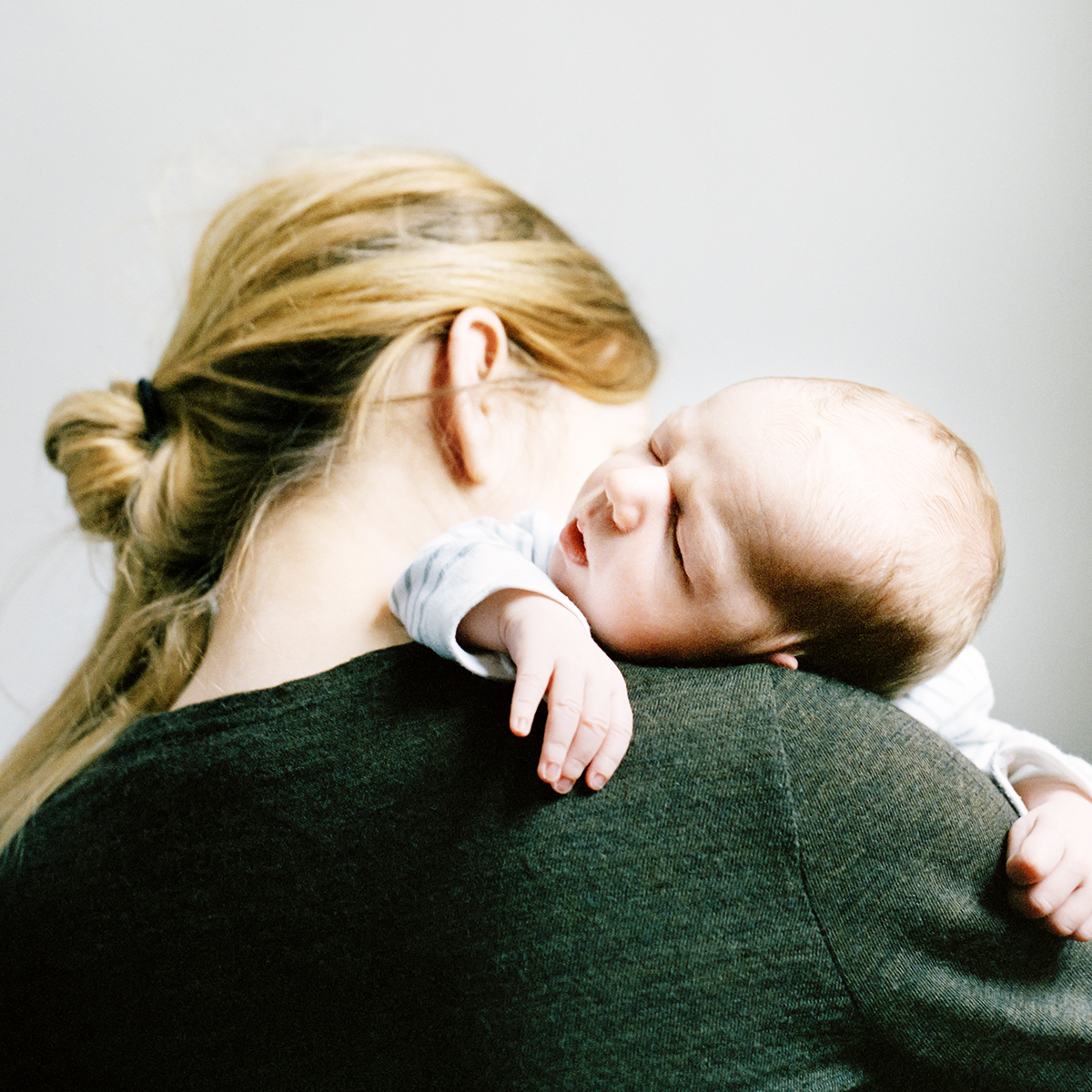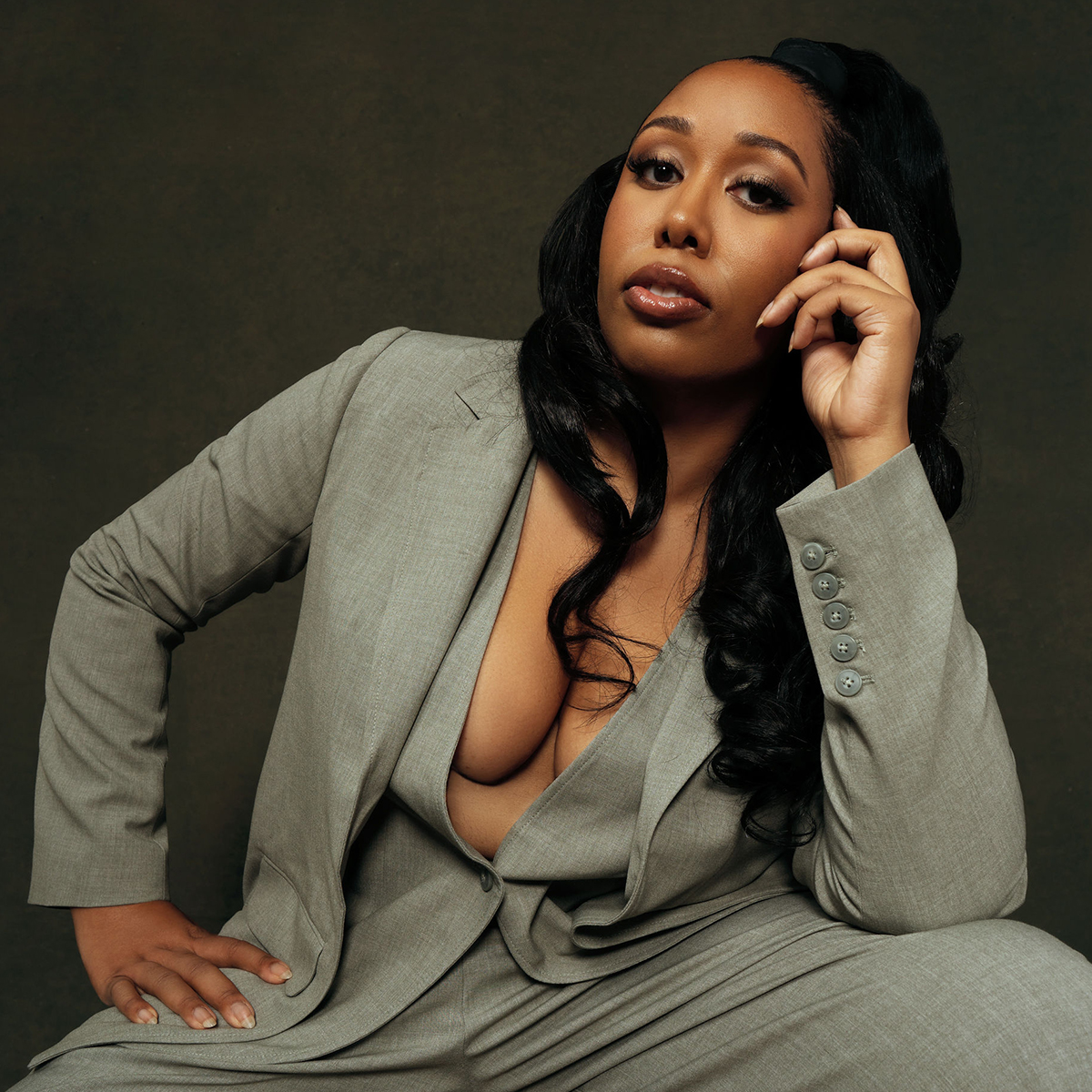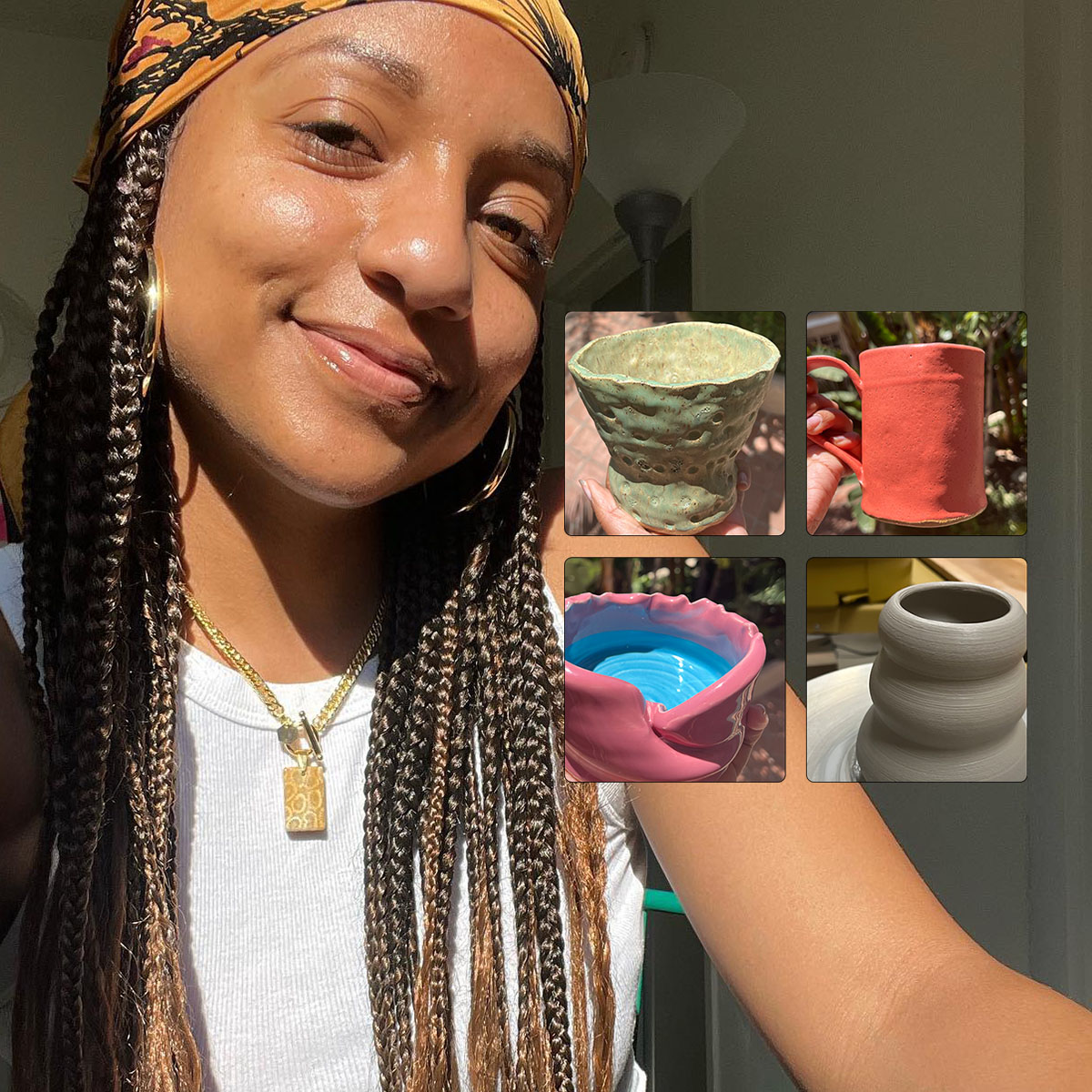It's Not Just "Baby Blues": My Life With Postpartum Depression
According to the National Alliance on Mental Illness, approximately 18.5% of adults in the United States experience mental illness every year. That's a significant portion of our population—one in five people—yet the stigma and misunderstanding that surround mental health remain. That's why in honor of Mental Health Awareness Month, we put the call out to our readers to share their own experiences with mental illness: their victories, their struggles, and what it's really like to negotiate a society that makes misguided assumptions about who you are based on an arbitrary definition of the word "normal." Our series My Life With highlights the raw, unfiltered stories of women who deal with anxiety, bipolar disorder, postpartum depression, and more, all in their own words. Below, Micaela Oer shares an intimate look inside her experience with postpartum depression.

I began my undergrad as a music major, but after taking an intro to psychology course, I switched my major to psychology. I was obsessed. I was a young woman on a journey to get to know herself better, and to me, this was a great way to do that. I remember early on being very fascinated by attachment theory and the different styles that children displayed. It made me think about myself and how I was as a child with my mother. (I had a rather difficult upbringing.) Even though I did not have plans on ever having children, I still kept that knowledge in the back of my mind, just in case.
Fast-forward a year and a half to June 2016. I had just started working full-time for the first time since I finished college. I remember coming home in the evening and just falling right to sleep on the couch. One day out of the blue, it occurred to me that I hadn't started my period yet. I called my best friend and casually brought it up that I was late. She immediately scolded me and then told me to get my ass a test. The next day, I grabbed one that I had stored for a rainy day, and I took it. Two minutes later, I saw the answer: yes. I was scared. I felt like my life as a happy, busy 20-something was done. No more hanging out with the girls on a whim. No more late-night Netflix binges with my husband. I was happy with who I was and where I was going. I wasn't ready for such a big commitment.
After a few months, I started to feel a lot more excited about having a little one. I didn't know anything about what was happening, but I was happy. I loved how I felt and looked as a glowing momma to be. But at the same time, I really tried not to show it. I so desperately wanted to be the "old" me. I didn't want my friends to think of me as "the pregnant one."
Around seven months, I started to feel anxious about what was ultimately going to happen. Up until this point, I had planned in my mind that I wanted to do childbirth naturally and without medication, but out loud, I told my doctor and husband that I just wanted to go with the flow.
On a regular visit to my OB, I found out that I had tested positive for cholestasis and that I had to be induced before week 37 to protect my baby. This news completely derailed me mentally. I knew the stats when it came to being induced, how so many times they lead to C-sections, and how women who have C-sections are less likely to breastfeed. My mind began to unravel. I started to have panic attacks because I could not stop thinking about what I would do if my child didn't bond with me. I was so consumed with having a "secure attachment" with my baby, that I started to reread notes that I had taken in developmental psychology to make sure I knew the results of different studies that had to do with attachment.
On Thursday of week 35, my doctor let me know that I need to be induced the next Tuesday. Tuesday night came around, and I remember walking down the hallway at the hospital with my husband, Michael, and seeing my reflection on the windows. I kept thinking, "You will never be the same person as you are right now."
Now, I know so many women that have a great (as great can be) delivery. I was not so lucky. Being induced was awful for me. Also cervix checks. I made it through one night without medication before my doctor suggested an anti-anxiety med and a pain med at the same time so I wouldn't remember the horror that is cervix checks. After three days without progress, I was exhausted and I opted for a C-section with a lovely spinal tap.
At 12:54 p.m., Andreas was born. He came out of my abdomen like Superman. He was immediately placed on my husband's chest while I was being put back together (I'm assuming). We spent the first hour in a room just us three and a nurse. I remember being asked if I wanted to breastfeed. I was on so much medication that I just said no. I blacked out here.
I was so lucky to have a great man next to me to take care of our new son while I recovered from a major surgery, but even with the help, I still couldn't put together the thought that that baby was mine. I felt nothing for Andreas. I looked at him, and I knew I had to take care of him, but I didn't love him like I thought I would. I felt really frustrated with him as well because he just wouldn't latch onto my breast. I thought, "If I can just get him to latch, he will have a healthy attachment."
Two days later, I was able to go home, but I didn't really want to. I did not feel confident in my ability to take care of Andreas or with being able to get him to latch. Also, my family arrived to see the new baby, and that felt very stressful for me. All of a sudden I had so many opinions and suggestions that I just could not sort them all out. I was extremely overwhelmed. I just wanted to do things the way I had planned, but I just couldn't speak up.
The first two weeks were painful. I realized right away what "baby blues" were. I found myself sobbing on the floor most of the day. Since I still was not able to get Andreas to latch, I was pumping and supplementing with formula, but I hated it. And I hated myself for not being able to do the thing that was natural. I knew that feeling sad was normal in the beginning, but I didn't think that I would be in so much emotional pain as I was.
I quickly recovered from my C-section, but as time went on, the pain that I was in emotionally and mentally remained. But when I went to my six-week checkup and Andreas's one-month appointment, I lied on the questionnaire asking about my mental health. I knew that I could have asked for help, but I wanted to be strong. I wanted to push through myself. I had failed at everything thus far (natural birth and breastfeeding), but surely this I could do. I had the psychology knowledge; surely I could use that on myself.
As the months continued, I started to feel more and more disconnected from myself. I didn't have the energy to reach out to anyone. It took too much for me to talk about what was going on, and I didn't want to burden someone else with my pain. My anxiety reached a new high. I was having panic attacks several times a week. When I would get Andreas to sleep and I would "rest," I never actually did. I would close my eyes, but it was like my body was still in motion. I would feel upset when my baby would wake up. When he cried, I just wanted to squeeze his arms. I hated myself for these thoughts.
That summer was hard. I pushed myself to get out of the house and walk every day. I made plans with friends. We went to mommy groups every week. I was still struggling. One day while driving in the car, Andreas began to scream in his car seat. I could not take it anymore. I started to scream back which, in return, made his crying worse. I called my sister who tried to calm me down. Hours later, I still felt out of control. My husband came home, and I lost it on him. Then I got into the car and drove away. I didn't know where I was going, but I knew I wasn't going to go back. Andreas and my husband deserved someone better than me. I was not a good mother. If disappearing was not going to work, I felt that maybe a more permanent solution would be the better choice. A few hours later, I drove back home. It was clear I needed to seek help.
Although I knew that therapy would help, I still couldn't find the energy to look up therapists. Thankfully, my husband picked up on that and started to send me different options that worked with our insurance. I still didn't call.
At the end of August, I got a call from my father that my mom was in the hospital with what they suspected to be a stroke. I immediately dropped everything and went home (eight hours away). It was clear that since I was the only one not working that I would be the one to stay and take care of my mom. Those five weeks I spent with my family were truly my eye-opening moment. How could I possibly take care of my 7-month-old and my mom?
The week I got back home, I looked through the list of therapist again. I came across someone who looked like a normal person in her picture. I called and left a message asking if she had done any work with postpartum depression and anxiety. She called back a few hours later, and we scheduled an appointment right away.
The next week, I sat with my therapist for the first time. I was scared. I could barely get any words out without breaking into tears. Halfway through the session, she stopped and said maybe the most life-saving words: "You know you don't have to suffer." She suggested that I think about taking some type of antidepressant. I was hesitant. Although I knew how life-changing these drugs can be for many people, I was afraid of them making me feel like someone I wasn't. But truthfully, I was already feeling like a completely different person. The next day, I found a new doctor, and two weeks later, I was prescribed Effexor.
The next several weeks were hard work. I was starting to feel the change in myself from the medication. I felt like I had more space in my head to think clearer. But in my sessions, the same things kept coming up. I was having a hard time with how the delivery happened. It bothered me that I couldn't remember it. It bothered me that Andreas was never able to latch. But the thing that bothered me the most was that I will never be the person I was before I got pregnant. I was confident in the person I was before, but I wasn't confident in the woman I was now.
We tackled these things head-on. I worked on starting to love myself for the person I was now. I told myself every day that I loved myself. I wrote little notes on our door with positive affirmations. I followed Hoda Kotb on Instagram because she has great uplifting posts. And it slowly started to work. Before the end of the year, I came into my session and I told her, "I love my son, and I love myself."
As time went on, things got a lot better. Around Andreas's first birthday, I started to feel low a bit. I was told that a lot of times this happens around the anniversary of a traumatic event. I continued on, and I can happily say that by February, I felt like new. I felt that by that point, if I had a rough day, I had the tools to help myself get out of my funk.
This experience was by far the hardest thing to overcome. Instead of using the knowledge I had from studying psychology to overcome my depression and anxiety, it backfired and almost became the reason I was feeling so bad. It took me eight months to reach out for help, knowing the signs. But I did it. And it changed me. Without me knowing it, it changed me into someone I didn't know I wanted to be.
It made me learn patience, self-acceptance, and that we should be proud of the people we become through challenging times. I realized that being someone who takes medication doesn't mean that I don't have the ability to help myself. I'm helping myself by giving my body what it needs to function correctly. It pushed me to start speaking out about what I went through, and through that, I've been able to connect with people who felt the same. I loved the "old" me, but I love this me more. And when the next chapter starts, I'll love her too.
This article is provided for informational purposes only and is not intended to be used in the place of advice of your physician or other medical professionals. You should always consult with your doctor or healthcare provider first with any health-related questions.
-
 This Founder Shares Why We Should Start Celebrating Rest
This Founder Shares Why We Should Start Celebrating RestBurnout is nothing to be proud of.
-
 Why Dr. Deepika Chopra Believes that Optimism is Resiliency
Why Dr. Deepika Chopra Believes that Optimism is ResiliencyWhy you should start embracing every feeling.
-
 How TikTok's Favorite Photographer Helped Me Find My Confidence
How TikTok's Favorite Photographer Helped Me Find My ConfidenceI renewed my relationship with myself.
-
 11 Things to Do If You're Dealing With Anxiety at Work
11 Things to Do If You're Dealing With Anxiety at WorkThese can help.
-
 Here's Why I Make Time for "Play" Every Day—and Why You Should Too
Here's Why I Make Time for "Play" Every Day—and Why You Should TooIt's one of the best things you can do for yourself.
-
 How to Choose a Plant Based on Your Personality Type
How to Choose a Plant Based on Your Personality TypeDo you have a green thumb?
-
 If You're Super Stressed Out, These 17 Things Can Make You Feel Better
If You're Super Stressed Out, These 17 Things Can Make You Feel BetterTry them.
-
 I Tried Pottery Classes as a Way to Better My Mental Health—Here's What Happened
I Tried Pottery Classes as a Way to Better My Mental Health—Here's What HappenedI left my classes with more than I bargained for.

